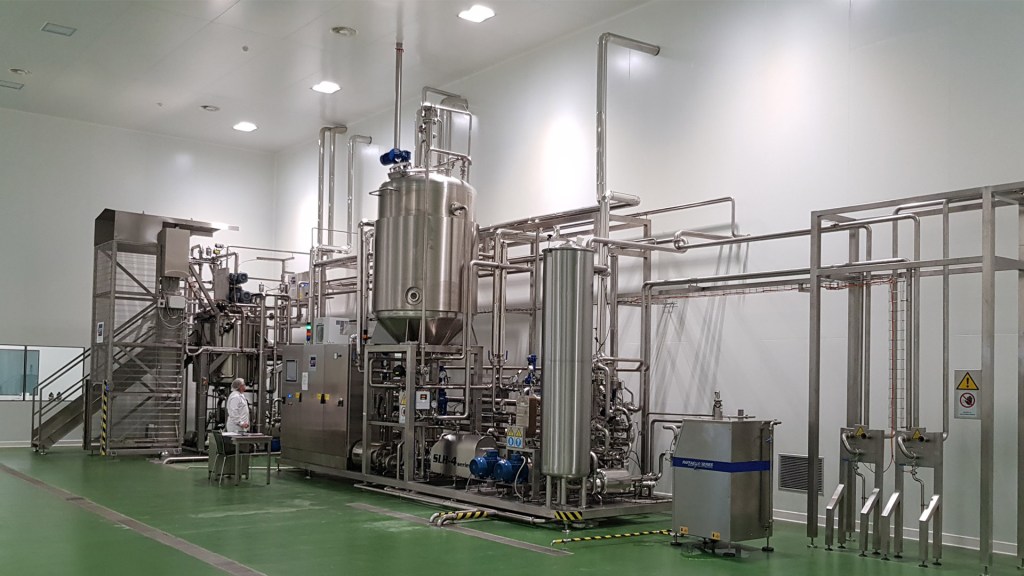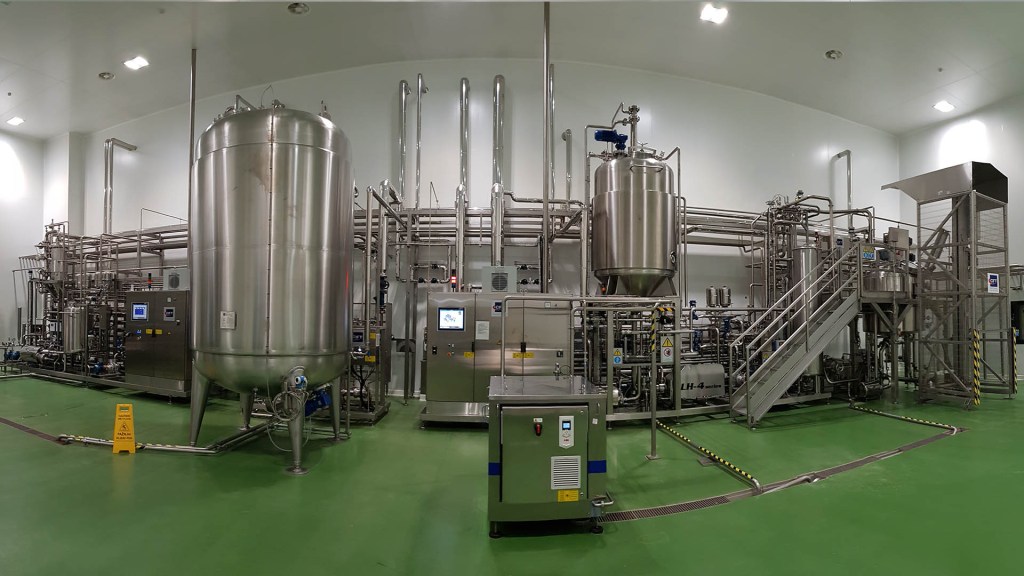We had known the management of Baby Food Factory since 2013, because we had already produced a complete Baby Food production line for another of their companies in Russia. So it was a great pleasure for us to be contacted by them again for an even more ambitious project to be developed in Belgrade, where Baby Food Factory is headquartered.
This time the project involved three complete Baby Food production lines dedicated to the production and packaging of baby food, one of which dedicated to the production of Kaša.
Just in case you have never tasted Kaša, it is a traditional Russian food, which is made by boiling buckwheat (or other cereals) in milk. It is often eaten also by adults along with meat and vegetables, particularly during the year’s festivities. For this reason, over the years, the word “Kaša” has also come to mean “celebration”.
Kaša Line
The preparation of Kaša by Baby Food Factory involves the use of high quality ingredients that have undergone the strictest controls required by European legislation: water, powdered milk, powdered cereal and minimal percentages of flavouring and fruit purée.
The line that we have designed is totally automated and includes the following processing stages:
- Dispensing of ingredients and Mixing: the ingredients are dosed, poured into the system and mixed with a CFT mixer, which makes it possible to create a wide variety of recipes, starting from all kinds of ingredients (powder, liquids, purées and concentrates). The milk is regenerated, the ingredients are added and homogenized in the batch
- Heat treatment with UHT sterilisation: the product is sterilized by the Olimpic FT machine, which has the power to sterilize low to medium viscosity foodstuffs and guarantee a totally aseptic product. The installation of the high pressure homogenizer makes it possible to improve the quality and texture of the final product.
- The sterilized product is stored in aseptic tanks each containing 10,000 litres, and then proceeds to final packaging.
The Kaša Line also has a dedicated CIP system, which makes it possible to wash all the components of the line automatically, from the mixing area to the fillers.

Baby Food production machines
We come now to the other two Baby Food production lines that we designed for Baby Food Factory: also in this case they provide an excellent example of technology “made in CFT Group”. The basic ingredients of these lines are fruit (also in chunks, if required), vegetables and flavouring in powder. The processing involved is similar to that of the Kaša Line, but with some important differences:
- The CFT Vulcano machine, a single kettle that can carry out a variety of operations such as mixing, frying, deaeration, cooking, milling, concentration, is used for mixing the ingredients.
- The heat treatment is carried out by a pasteurizer so as to guarantee the correct shelf life to the final product.
- The homogenizer, a standard application in this type of system, makes the product more stable from the quality perspective and improves its final appearance.
The substantial difference between these two Baby Food production lines lies in the capacity and the filling phase. The first line has a capacity of 1,200 kg and filling is carried out using pouches; the second line has a capacity of 2,700 kg and the filling process uses glass jars and a CFT filler.
The second Baby Food Production line also has 3 Levati autoclaves installed, for the sterilization of the product already packaged in the glass jars. These autoclaves make it possible to modulate the water cycle in order to guarantee uniform distribution of the heat inside the chamber, thereby reducing sterilization times, and considerably improving product quality.

Thanks to these 3 Baby Food production lines, the CFT Group has made a fundamental contribution to the establishment up of the Baby Food Factory in Belgrade, completing with state-of-the-art technology an already ultra-modern facility that extends for 33,500 sq.m., with a production capacity of approx. 50 tonnes of product per day..
Walking along the corridors that lead to the various rooms of the plant, it is immediately clear that the entire production environment, the laboratories and transit areas are in line with clean room hygiene and safety standards and are equipped with the same kind of wall panels as those normally installed in clean rooms. This means a total absence of impurities and an extremely high level of hygiene, also guaranteed by a system that filters any air entering from the outside.
This type of configuration is not standard for Baby Food production lines. Baby Food Factory, however, were adamant on the need for a facility of this kind, with an investment that would allow the company to reach hygiene and safety levels that would very difficult to match.
Baby Food Market
The size of the Baby Food market in 2014 was estimated at 50.7 billion dollars and it is expected to reach 72.7 billion dollars by 2020, with a CAGR of 6.4{46ec2a3493715af7728c32a403f8e2e213c1486a2b6674762cf12f27ee9af20a} during the period 2015-2020*.
In many countries, especially those under-developed or developing, children are nourished traditionally with soft, home-made food. However, growing urbanization and changing lifestyles have increased the demand for packaged foods for children in various societies and cultures. These foods are fed to children aged between 4/6 months and 2 years.
Increasing awareness of the importance of diet, the increase of retailing and the ever-growing number of working mothers are the key factors responsible for the upsurge of the Baby Food industry.
In CFT Group we are ready and willing to accept the challenge of this emerging market, and thanks to our across-the-board experience in the processing and packaging of Food, Liquid Food and Beverages, CFT Group can guarantee impeccable, specialized know-how, acting as an ideal partner also for the design and construction of complete Baby Food production lines and single machines.
*Source: alliedmarketresearch.com
